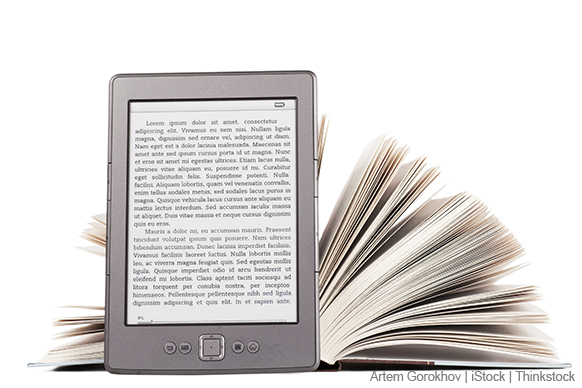E-Books or Print Books? That Is the Question.
by Kim Nguyen
1 Teenagers curled in armchairs or jet passengers reaching cruising altitudes often reach for a paperback or a print magazine. Today, they are just as likely to grab an e-reader or a tablet and settle down for a cozy, digital read.

2 The e-book revolution is here. One online bookselling behemoth reported it sells more e-books than print books. In 2010 alone, the sales of digital books increased by a whopping 164 percent. In 2013, the Association of American Publishers announced that e-books accounted for 20 percent of all book sales.
3 So, what's the story with both of these kinds of books and, ultimately, which one is better?
How It All Began
4 Almost everyone agrees that the first printed book was the Diamond Sutra. The Diamond Sutra was printed in China in 868 AD. With the later invention of the printing press, reading became increasingly accessible to larger numbers of people. Today, most people on the planet can read. According to the UNESCO Institute for Statistics, about 84 percent of the world's adults were literate in 2011, and the global youth literacy rate topped 89 percent. What have all these people been reading? According to Google, we have had many choices when it comes to books. Google recently estimated that throughout human history about 130 million books have been written. Now think of the books that have sold many, many copies. Charles Dickens's A Tale of Two Cities, for example, has sold over 200 million copies. And that's just one title. No matter how you do the math, there are numerous print books out there.
5 The identity of the first e-book is more controversial. Although seeds were sown as early as 1940, many historians agree that e-books began in the 1960s. In 1971, Michael Hart of the University of Illinois launched Project Gutenberg to make electronic versions of classic texts available to anyone with access to a computer. By 1992, Sony had launched the Data Discman, an electronic book reader. When novelist Peter James published his thriller Host on two discs in 1993, it was billed as the “world's first electronic novel.” However, the reception was grim. “I got absolutely pilloried,” says James. “I was on Today (a morning TV show) accused of killing the novel …99 percent of the press was negative.”
The Advantages of Print Books
6 Killing the novel? Now there's a plot for a gripping murder mystery.
7 It seems clear that some people feel strongly about the superiority of printed books over e-books. Why? First and foremost, when readers choose print books, they choose to experience the physicality of the book: the cover that encloses and protects what's inside, its relative heft, the carefully chosen typeface and creamy-colored paper. Print book readers enjoy the feel of the book in their hands as well as the texture and edges of each page. Every book is unique. Hotels offer copies of the Bible with black leather covers and gilded pages; a full set of the printed Encyclopedia Britannica weighs as much as a human being; a softcover version of On the Road is pliable enough to carry in a pocket.
8 A major advantage of a print book, proponents say, is that you don't need electricity. With a print book, you never need a battery charge. While e-book supporters suggest that e-books are greener than paper books, they should examine these facts. According to treehugger.com, producing e-reading devices involves tens of thousands of workers in more than thirty companies on three continents. In one year, e-reader production released 2,350 million kilograms of carbon dioxide into the atmosphere. Furthermore, less than 10 percent of these devices are recycled; broken and outdated devices end up in landfills. When you consider the production and disposal of e-readers, e-books may not be greener than print books after all.
The Advantages of E-Books
9 “It's much easier to purchase an e-book spontaneously,” M.K. of Boston, reports. “They are less of a commitment, easier to discard, and there is no need for bookshelves!” They can be delivered in seconds, are less expensive to buy, and don't require transportation costs or create pollution due to shipping books across the country and around the world.
10 People who travel adore e-books; in fact, travelers may be the e-book's strongest market. As B.R. of Staunton, Virginia, comments:
I first read an e-book when I traveled last summer. The opportunity to bring several books that weighed next to nothing motivated me to experiment. I read books by authors I'd never heard of before. To my great surprise, I found myself reading more slowly than usual, savoring the words like a fine meal, more than I do when I read a paper book.
11 As many people have figured out, an e-book library is portable. Anyone who has ever lugged boxes and boxes of print books from a moving van up to a third-floor apartment will agree that it's much easier and less expensive to move and store e-books. The average American moves 11.7 times; and most people who keep print books are packrats, accumulating more and more of them as time goes by. That's a lot of heavy lifting.

12 E-books also make reading easier for people with disabilities. Text can be enlarged and screens can be lit for sharper contrast, both of which help people with vision impairments. There are e-book readers that can also play audio books, another benefit for the visually impaired.
13 E-book text can be hyperlinked so readers can learn more about a topic with the touch of a finger, but perhaps the most extraordinary advantage of e-books is the search function. For example, students who have to write a paper comparing two characters in a novel can electronically search for each mention of the characters' names. No more flipping through the book page by page.
14 And, for better or worse, almost anyone can publish an e-book and post it on the web. All it takes is a computer and access to the Internet. You do not need to own a printing press. This fact encourages diversity and freedom of expression, and a healthier balance between commerce and culture.
A Hybrid Future
15 Choosing between e-books and print books is not like choosing which of two sports teams you prefer. With e-books and print books, you will probably want to go with a little bit of both. The future will certainly include both. B.R. is able to define her own personal distinction: “When it comes to reading books that are rooted in story, I prefer e-books. When it comes to reading non-fiction that toys with ideas, give me paper.”
16 M.K. sees it another way. “An e-book is searchable while a paper book is browse-able.” They are very different experiences—searching and browsing—and people aren't likely to choose one or the other exclusively.
17 So, print books and e-books can co-exist! And maybe that's a formula for so many things in our diversified, hybrid world that look like opposites (but aren't).